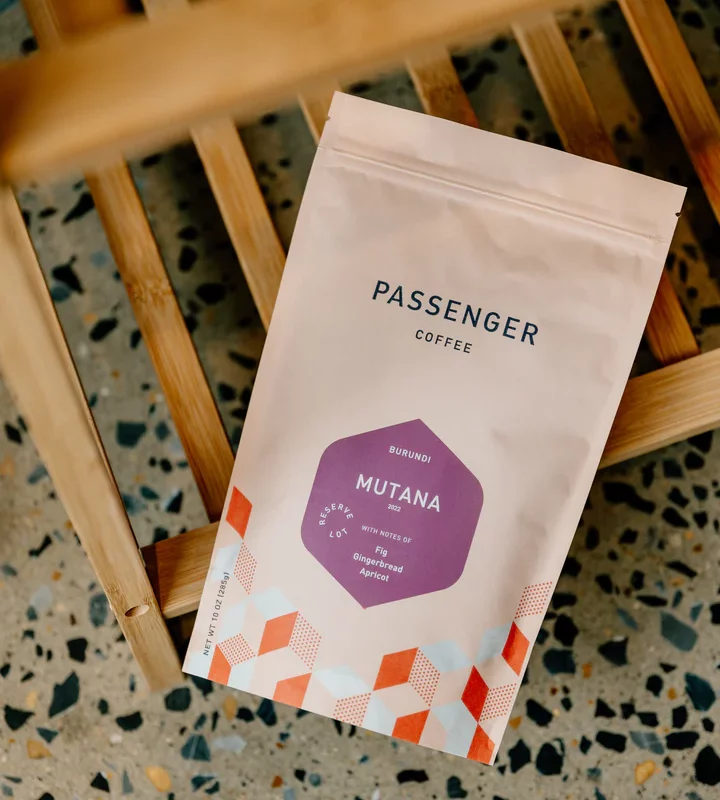
About this Coffee
This wet processed coffee from Heza washing station in Kayanza, Burundi, features an inviting fragrance of candied ginger, citrus peel, fresh plum, and florals on the nose. An aroma of warming spice and sweetbread opens up to an array of dried stone fruits and fig in the cup, with a base of creamy cocoa and black tea rounding out the finish.
Founded by Ben and Kristy Carlson in 2013, the Long Miles Coffee Project serves as an inspiring point of connection between rural Burundian coffee farmers and the international specialty coffee market. This wet processed lot, composed of coffee harvested by smallholder farmers on Mutana Hill, was pulped, fermented, washed and dried at the Heza washing station, and carefully preserved in frozen storage since its arrival at Passenger’s roastery.
With a geographical area of less than 11,000 square miles, Burundi is a small, landlocked nation situated at the intersection of East Africa and the African Great Lakes region. Coffee production was forcibly introduced to the country in the 1920’s, after the German colonial territory of Ruanda-Urundi was allocated to Belgium by the League of Nations. Belgian colonial rule in those years mandated that every peasant farmer in the country cultivate at least fifty coffee trees. And while the Burundi coffee industry has navigated various seasons of privatization and nationalization since the country gained its independence in 1962, Burundian coffee continues to be produced by tiny, smallholder farmers who traditionally deliver the fruit of their coffee trees for sale and processing at one of ~140 washing stations that dot the country – many of which are owned by the state.
Founded by an American couple who moved to Burundi in 2011, the Long Miles Coffee Project has earned a strong reputation throughout the international specialty industry as an innovative, farmer-driven producer of top quality Burundian coffees. Noting that coffee farmers in Burundi stood to benefit from improved access to the specialty market and that specialty roasters struggled to source traceable coffees of consistent quality in Burundi, Ben and Kristy Carlson perceived an opportunity to make a positive impact on both fronts. Following the construction of the first Long Miles washing station, Bukeye, in 2013, the team has opened two additional processing sites (Heza and Ninga) in more recent years. Each Long Miles washing station is strategically located in close proximity to thousands of rural coffee farmers who are members of distinct hill communities (the smallest geopolitical unit in Burundi is the colline or “hill”). During the harvest season, each microlot produced by the Long Miles team is kept separated and traceable to the specific hill where it was harvested. For example, all microlots processed at the Heza site are traceable to, and named after, one of five hills that deliver to the washing station during harvest: Mutana, Nkonge, Mikuba, Gitwe, and Gishubi. While Long Miles is capable of producing exceptional quality honey and natural processed coffees, which are often featured on Passenger’s menu as well, this wet process lot from coffees grown on Mutana hill was pulped, fermented, washed and dried at the Heza washing station.
Passenger is proud to count the Long Miles Coffee Project, and the communities of Burundian coffee farmers that they work closely with, as one of six Foundational Partnerships that form the heart of our sourcing program. For each of these producer partnerships, our goal is the same: to buy as significant a volume as we can each year on an ongoing basis, intentionally prioritizing the purchase of a broad spectrum of available quality grades. Since 2018, Passenger’s primary menu offering from Burundi has been the Heza Foundational lot, named for the Long Miles washing station where the majority of our annual selections are processed, including this Reserve Lot menu selection from coffees grown on Mutana hill.